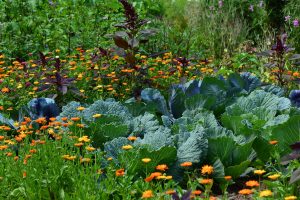Crop diversity improves environmental health, yield, and resilience under climate stress
 Photo Credit: Conger Design
Photo Credit: Conger Design
New research shows that there is good news when it comes to supporting the health of our environment—growing a diversity of crops can increase biodiversity, without taking a toll on crop yield. In fact, in stressful conditions that are becoming more frequent with climate change, yield increased in diversified cropping systems. The study published in Agriculture, Ecosystems & Environment found that diversifying crop rotations improved yields and increased natural pest control during stressed conditions such as drought. Future climate changes will continue to pose threats to crop production. To mitigate and adapt to climate change, farming practices need to reduce environmental impacts. Diversifying crops, reducing synthetic pesticide and fertilizer inputs, and adding non-crop vegetation are all practices that can mitigate climate change. This study tested whether diversifying crops to improve ecosystems services might come with trade-offs in yield, particularly under stressed conditions. Researchers measured yield from fields at three levels of crop diversity under stressed versus controlled conditions. They also reduced inputs that would otherwise manage pests and soil fertility. Despite the stressful growing conditions, crop yields increased overall with higher crop diversification. The authors suggest that while maintaining yield is important, other ecosystem services need to be supported. To achieve the greatest benefit, multiple practices beyond crop diversification should be used simultaneously.

